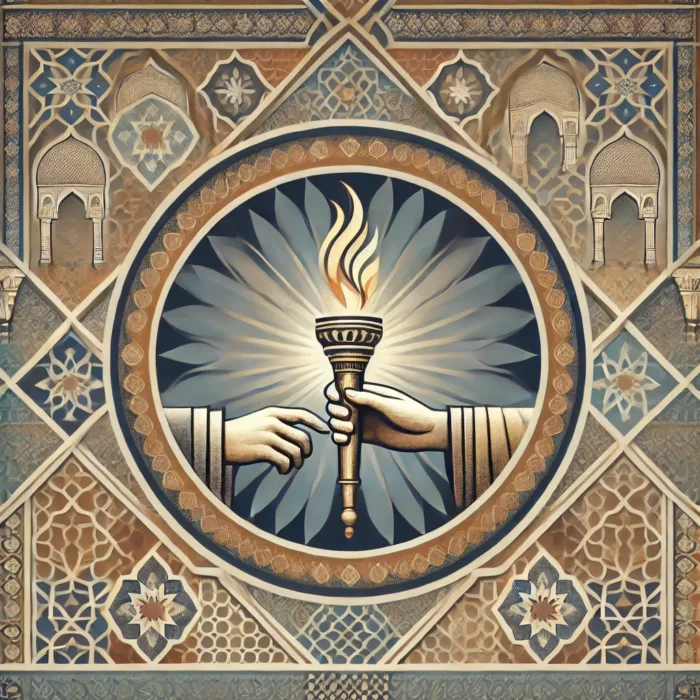Table of Contents
Introduction
The thirteenth article in the series the “Era of the Rightly Guided Caliphs“ focuses on the noble examples of sincerity and devotion to ALLAH in the early days of Islam. It emphasizes how the Rightly Guided Caliphs and military leaders embodied this selflessness, which played a crucial role in the strength and success of the Islamic Ummah. To explore the full series, Click here.
The Nature of Muslim Leadership and Responsibility
By nature, a Muslim strives to ease his burdens. It is important for a Muslim to hold himself and his family accountable. However, the responsibility becomes even heavier and more challenging when it extends beyond this, especially if it involves leading thousands, hundreds of thousands, or even millions.
Al-Fudayl ibn ‘Iyad said:
“Abandoning work for the sake of people is showing off, working for the sake of people is polytheism, and sincerity is when ALLAH protects you from both“
Sincerity is not merely about doing or refraining from actions; it is about prioritizing the interests of the Ummah and being devoted to ALLAH in all matters.
A Muslim is not obligated to seek leadership or fight for it, as long as there is someone more qualified and suited for the role. However, if he is the most capable, then he must step forward and take on that responsibility. As Prophet Yusuf (Peace be upon Him) said:
“‘Appoint me over the storehouses of the land. Indeed, I will be a knowing guardian‘”1
(Suraat Yuusuf, 12:55)
The Foundation of Islamic Unity: Selfless Leadership after the Prophet’s Death
Indeed, during the early period of Islam, particularly in the era of the Rightly Guided Caliphs, the Islamic nation set a remarkable example of selfless devotion and sincerity to ALLAH, the Blessed and Exalted. A closer look at the biographies of the Rightly Guided Caliphs reveals many such instances of this dedication. Without these acts of sincerity, the nation would have fallen into divisions, disturbances, and conflicts long ago. Its affairs would have unraveled, its strength would have waned, and its power would have diminished. The great glory that was built would not have been possible.
Immediately following the death of the Prophet (Peace be upon Him), we encounter several moments of deep devotion to ALLAH. Initially, when the Muhajirun gathered around Abu Bakr (may ALLAH be pleased with him), news reached them that their brothers from the Ansar had convened in Saqifah Bani Sa’idah to discuss the matter of the caliphate. At this point, Abu Bakr, Umar, and Abu Ubaidah went to the Ansar to engage in this important discussion.
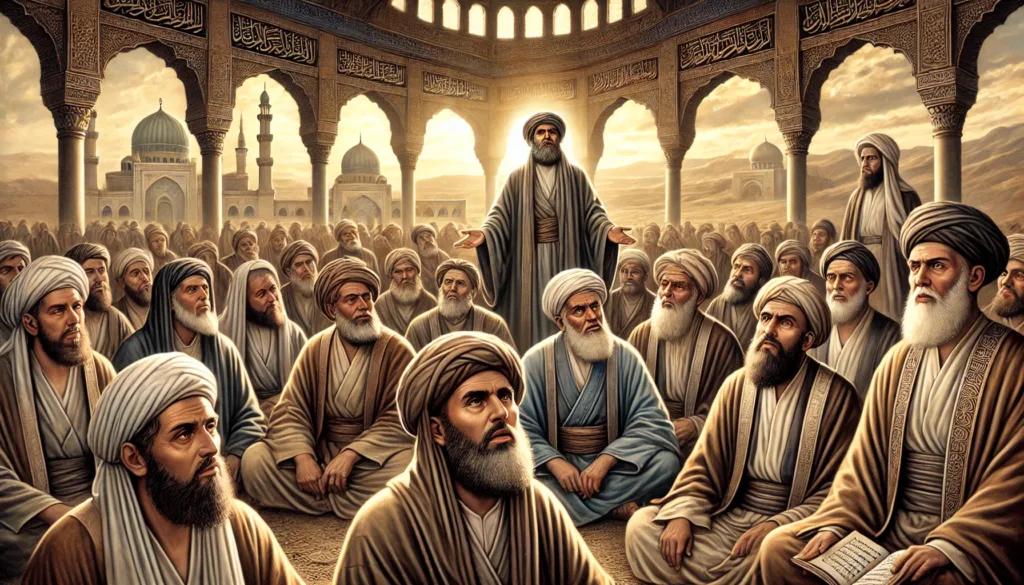
Before they arrived at the Saqifah, they encountered two men from the Ansar. The two men asked, “Where are you heading, O Muhajirun?” The response was, “We are seeking our brothers from the Ansar“. To this, the men replied, “You need not concern yourselves with them; decide your matter“. These two Ansar were, in fact, aligned with the Muhajirun, and their stance was in contrast to what might have been in the interest of their own people, which was unusual according to Arab custom.
This moment highlights a remarkable example of selflessness. These two Ansar chose to support the Muhajirun and did not side with their own people in the discussion about the caliphate. We cannot know for certain whether there had been any prior disputes or disagreements between the Muhajirun and Ansar on this issue, or if these two men believed that the Ansar would not oppose the Muhajirun if they reached a consensus. Nonetheless, both perspectives reflect their sincerity, as well as the sincerity of the Ansar as a whole.
The Wisdom of Unity: Abu Bakr’s Diplomatic Resolution
However, from another perspective, Abu Bakr and Umar did not celebrate the division within the Ansar’s position. Instead, they responded, “By ALLAH, we shall go to them“. When they arrived, another moment of sincerity unfolded. Abu Bakr (may ALLAH be pleased with him) addressed the Ansar, explaining that the matter at hand was no longer simply about leadership in Medinah or limited to the people of the city. Rather, the Islamic state had expanded to include the entire Arabian Peninsula, and the Arabs would only submit to someone from Quraysh.
Abu Bakr was not diminishing the status of the Ansar nor elevating the status of the Muhajirun; rather, he was focused on the best interest of the Ummah. He said,
“Whatever good you have mentioned about yourselves, you are indeed worthy of it. However, this matter will only be accepted by the tribe of Quraysh. They are the most distinguished among the Arabs, both in lineage and in their place of residence.
O Ansar, by ALLAH, we do not deny your virtue, nor your early embrace of Islam, nor the rights you hold over us. But you know that this tribe of Quraysh occupies a position among the Arabs that no one else does, and the Arabs will only unite under a man from them. So, we are the leaders, and you are the ministers. Fear ALLAH and do not divide Islam, and do not be the first to introduce something new into it“
At that moment, one of the Ansar, Al-Hubab ibn Al-Mundhir (may ALLAH be pleased with him), proposed, “Let there be one leader from us and one from you“. This clearly shows that the Ansar recognized the higher interest of the Ummah, which is why they immediately considered sharing the leadership with the Muhajirun. Umar ibn Al-Khattab (may ALLAH be pleased with him) also kept the Ummah’s best interest in mind when he replied, “Two swords cannot fit in one sheath“. The interest of the Ummah, he emphasized, did not require two caliphs or the division of power between two rulers.
Abu Bakr, once again, emphasized, “Rather, we are the leaders and you are the ministers“. By saying “we“, he was referring to the Muhajirun, and specifically to Quraysh, to whom the Arabs would only submit. Then came the response of the Ansar, which demonstrated great sincerity. They willingly relinquished the caliphate to the Muhajirun, showing their obedience and loyalty even beyond their own personal interests. They were supporters of the Muhajirun, just as they had been supporters of the Prophet (Peace be upon Him).

This sentiment was expressed by the Ansar themselves, and thus, what could have been a divisive conflict was peacefully resolved, averting consequences that only ALLAH truly knows.
The Choice of Humility: Leadership Through Self-Denial
Another scene of selfless devotion unfolds when Abu Bakr says, “I have nominated for you one of these two: Umar ibn Al-Khattab and Abu Ubaidah ibn Al-Jarrah“. Umar ibn Al-Khattab, reflecting on this moment later in his life, expressed: “By ALLAH, that I should be brought forward and my neck struck, without drawing me near to sin, is more beloved to me than to take authority over a people among whom is Abu Bakr“. Neither Umar nor Abu Ubaidah sought the position of caliph in the presence of Abu Bakr, and both chose to put him forward instead.
When the consensus was reached in favor of Abu Bakr, he spoke these heartfelt words:
“By ALLAH, I never asked ALLAH for leadership, neither by day nor by night, neither in secret nor in public, nor was I ever eager for it. Rather, I have been entrusted with a great responsibility, and I have no strength for it except with ALLAH’s help“
In this way, the Muslims during the early Rightly Guided Caliphate navigated the moment of the Prophet’s death (Peace be upon Him) with sincerity and devotion to ALLAH. Had this sincerity been absent, the outcome could have been disastrous; no one would have known what the consequences might have been.
The Legacy of Succession: Umar’s Model of Selfless Transition
When our master Umar (may ALLAH be pleased with him) assumed the caliphate, his acceptance of the responsibility after Abu Bakr’s death was also an act of sincerity. As we have mentioned, sincerity is not simply about doing or refraining from something; it is about prioritizing the interest of the Ummah and being devoted to ALLAH, the Blessed and Exalted, in both action and abstention. Umar ibn Al-Khattab, who had completely refused to take leadership in the presence of Abu Bakr, was the one who accepted the caliphate after Abu Bakr (may ALLAH be pleased with him) passed away.
When Umar ibn Al-Khattab neared his death and sought to prevent division within the Ummah after him, he suggested six candidates for the caliphate. These six were among the ten who were given the glad tidings of Paradise, with the exception of one man, Sa’id ibn Zayd (may ALLAH be pleased with him), whom Umar excluded from the consultation and nomination because he was a relative of his.
When Al-Mughirah ibn Shu’bah suggested to Umar, “Won’t you include your son AbduLLAH ibn Umar?“—and AbduLLAH was among the scholars of the companions, and one whom the Messenger of ALLAH (Peace be upon Him) was pleased with—our master Umar became stern with him and replied,
“You have spoken words that do not seek ALLAH’s pleasure! It is enough for the family of Umar that one of them should attain this position. If it is good, then we have already received it, and if it is evil, it is sufficient that only one of us is involved“
As a result, Umar excluded his relative Sa’id ibn Zayd from the list of candidates, and the final list of six candidates consisted of the remaining members of the ten who had been given the glad tidings of Paradise.
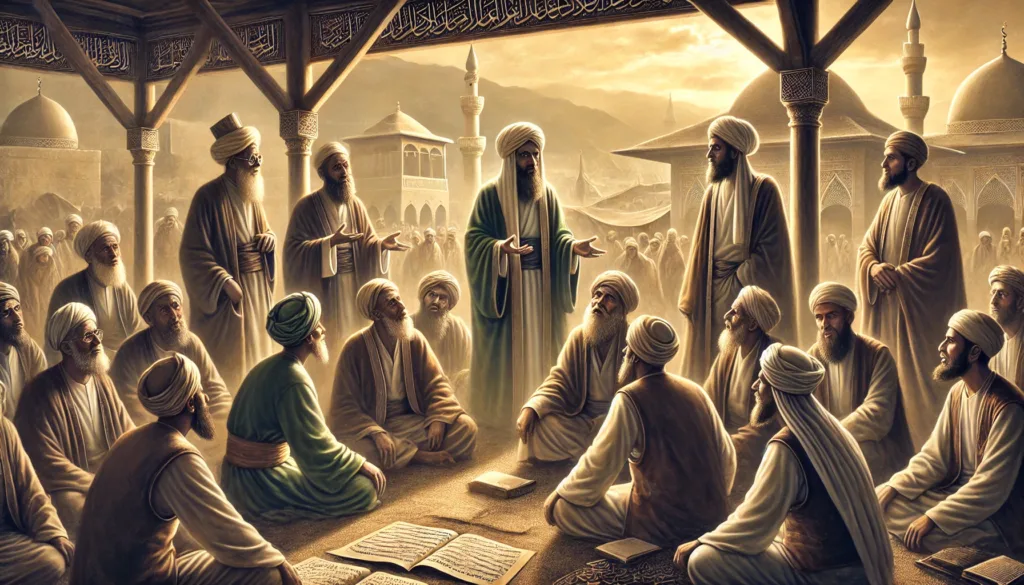
Here, another scene of sincerity unfolded: the six candidates were swiftly reduced to two. Abd al-Rahman ibn Awf (may ALLAH be pleased with him) suggested a way to narrow down the options: “Let each of you delegate your opinion to another“. Talha then said, “My opinion is for Uthman“, and stepped down, giving his support to Uthman. Zubayr also stepped down and gave his support to Ali, while Sa’d ibn Abi Waqqas stepped down and delegated his opinion to Abd al-Rahman ibn Awf.
This means that three of the six candidates for the caliphate withdrew after just a few words. Then, when only three candidates remained, Abd al-Rahman ibn Awf also withdrew himself from consideration, on the condition that he would manage the nomination process. He agreed to oversee the pledge of allegiance and the selection of the caliph, but made it clear that he would have no part in the matter himself and would not accept the position of caliph.
Remarkably, it only took one session for the six candidates to be reduced to just two. The people of Medinah deliberated, and in the end, they selected Uthman ibn Affan (may ALLAH be pleased with him). The key takeaway here is that the selfless devotion demonstrated by the Rightly Guided Caliphs was instrumental in navigating matters that, had they not shown such sincerity, could have led to dire consequences for the entire Ummah.
Military Leadership: Balancing Authority and Divine Victory
If we shift our focus from the caliphate to the broader example of devotion to ALLAH within this righteous generation, one of the most notable stories involves Abu Ubaidah ibn Al-Jarrah and Khalid ibn Al-Walid (may ALLAH be pleased with them both). Khalid ibn Al-Walid, known as one of the greatest warriors in history, was an unmatched horseman and a military leader whose victories remain legendary, a testament to his unparalleled skill and strategy in battle.
Khalid’s personality was one that thrived under broad authority—he was a leader who preferred to be entrusted with wide-ranging powers. Abu Bakr, likewise, was a leader who believed in granting his governors and military commanders considerable autonomy. However, a disagreement arose between Abu Bakr and Umar regarding Khalid.
Umar ibn Al-Khattab was concerned that people might become overly attached to Khalid and begin to believe that victory was tied to him personally. He feared that this would be a temptation for the Ummah, diverting their focus from the true source of victory, which is ALLAH, the Blessed and Exalted. To prevent this, Umar advised Abu Bakr to dismiss Khalid, so that the people would recognize that victory comes solely from ALLAH and is not the result of any individual, not even Khalid’s sword.
However, Abu Bakr (may ALLAH be pleased with him) did not agree with this advice. He did not believe that Khalid’s occasional mistakes or shortcomings justified dismissing him. Abu Bakr saw no reason to remove Khalid, especially when considering his brilliance and invaluable contributions to the Ummah in the battles and his role in the Jihad.
This difference of opinion between Abu Bakr and Umar—though not truly a dispute, but rather a difference in perspective—took a new direction when Abu Bakr (may ALLAH be pleased with him) passed away and Umar became the caliph. Upon assuming the caliphate, Umar decided to send a message to Abu Ubaidah ibn Al-Jarrah, instructing him to relieve Khalid ibn Al-Walid from his leadership position and to return the general command to Abu Ubaidah.
From Commander to Subordinate: The Interplay of Authority and Humility
If we shift our focus from Umar ibn Al-Khattab and turn to Abu Ubaidah ibn Al-Jarrah, we encounter another remarkable scene of selfless devotion and sincerity, particularly in his relationship with Khalid. From the beginning of the wars of apostasy, Khalid had been a commander of the armies. His leadership continued through the conquest battles, and when the Levant front needed him, Abu Bakr advised Khalid to leave the Persian front and head to the Levant. Khalid accepted this and took on the role of general commander of the armies in the Levant.
There were five armies on the Levant front: one under Abu Ubaidah’s command, one under Yazid ibn Abi Sufyan’s command, another under Shurahbil ibn Hasana’s command, one under Amr ibn Al-As’s command, and another under Sa’id ibn Zayd’s command. When Khalid arrived, he took the position of general commander of these armies, a position that had previously been held by Abu Ubaidah ibn Al-Jarrah.
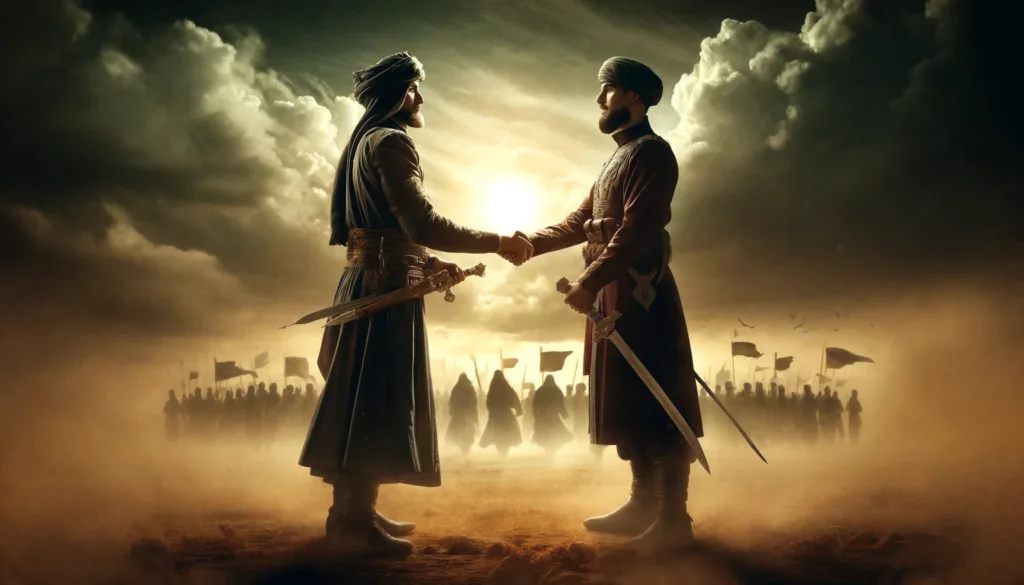
Abu Ubaidah ibn Al-Jarrah was deeply trusted by the Ummah, regarded as the third most prominent figure after Abu Bakr and Umar. Historical accounts and the words of Abu Bakr suggest that Abu Ubaidah was initially considered the nominee for caliphate at the Saqifah of Bani Sa’idah, and Umar later expressed that he wished he had been present at his death, acknowledging Abu Ubaidah as a remarkable figure. When Khalid ibn Al-Walid arrived at the Levant, Abu Ubaidah, who had previously held the position of general commander, stepped down from that role and placed Khalid in charge of all the armies. This marked a pivotal moment in the ongoing conquests of the Levant.
However, when Umar became caliph, he sent a letter to Abu Ubaidah instructing him to relieve Khalid ibn Al-Walid from his position and take back the general command. In a rare moment of sincerity, Abu Ubaidah concealed the letter and hesitated to act on Umar’s command, unwilling to remove Khalid while he was achieving victory after victory. It was only after Umar sent a second letter, insisting that Abu Ubaidah carry out the order without hesitation, that Abu Ubaidah complied and relieved Khalid of his command, taking on the role himself.
When Abu Ubaidah ibn Al-Jarrah finally acted on the order and relieved Khalid ibn Al-Walid of his command, Khalid, upon learning that the decision had been made months earlier, responded with deep respect:
“May ALLAH have mercy on you, O Abu Ubaidah! You follow my lead while you are the imam, and you pray following my prayer, when the right was that you should have been put forward and you should be the commander. This army is your army, and these soldiers are your soldiers“
The Battle of Yarmouk: Leadership Through Mutual Trust
And here came Khalid ibn Al-Walid’s turn in selfless devotion and sincerity. He willingly stepped down from the position of general commander, returning to his role as commander of his own army, while the general command was once again handed to Abu Ubaidah ibn Al-Jarrah (may ALLAH be pleased with him).
Shortly after, the Muslims would face one of the most decisive battles in history—the Battle of Yarmouk. The Roman strategy to reclaim lost territories involved directing their armies south into the Levant, forcing the Islamic forces to retreat from their cities and concentrate to confront the Roman army.
As the Muslims approached the gates of Yarmouk, where the Romans had assembled a massive force—one they had never gathered before—the five commanders of the Islamic armies gathered to discuss their strategy. It was in this moment that one of the greatest acts of selfless devotion occurred.
Khalid ibn Al-Walid said to Abu Ubaidah ibn Al-Jarrah, “I want to take charge of this battle“, meaning that he requested to be placed in command of the forces beyond the gates of the battlefield. Abu Ubaidah, recognizing Khalid’s military genius, replied, “I have put you in charge“, and stepped aside to allow Khalid to lead the decisive Battle of Yarmouk. In that moment, the general command returned to Khalid ibn Al-Walid, and he became the commander of all the armies. Under his leadership, the Muslims achieved a brilliant victory at Yarmouk. Once the battle was won, Khalid returned to his previous role as an army commander, and the general command returned once again to Abu Ubaidah ibn Al-Jarrah.
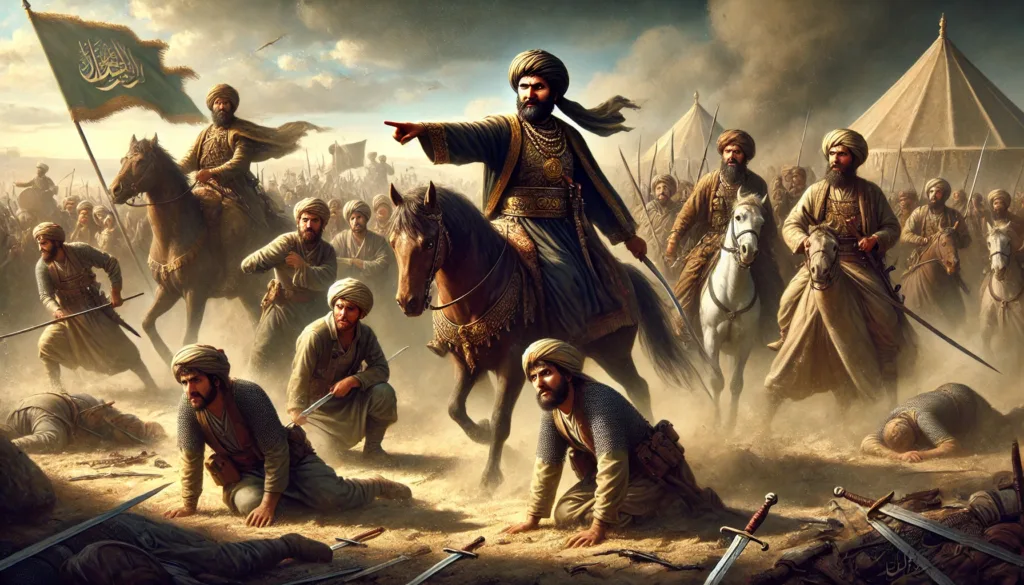
This exchange of leadership is a remarkable example of selflessness and devotion to the greater good. Had these two great men not possessed such sincerity and willingness to step aside for the good of the Ummah, it is hard to imagine what the outcome would have been for the Islamic armies. The fate of the Levant, the success of the Muslim campaigns against the Romans, and even the future of Islam in the Arabian Peninsula could have been very different.
Al-Muthanna’s Legacy: From Independent Commander to Loyal Subordinate
Another powerful scene of devotion to ALLAH among our early predecessors (may ALLAH be pleased with them all) is the story of Al-Muthanna ibn Haritha Al-Shaybani (may ALLAH have mercy on him). Al-Muthanna, the leader of Bani Shayban, began his efforts in the conquests without being officially appointed by Caliph Abu Bakr (may ALLAH be pleased with him). He initiated the campaign by pursuing the remnants of the Persians who had supported some of the apostasy movements.
Al-Muthanna took the initiative, attacking and disrupting the Persian forces, and he sent word of his actions to Caliph Abu Bakr in Medinah. When Caliph Abu Bakr decided to expand the conquests, he sent two armies to the Persian front: one under the command of Khalid ibn Al-Walid, and another under Iyad ibn Ghanm Al-Fihri, both tasked with advancing towards Al-Hirah. Abu Bakr declared, “Whichever of you reaches Al-Hirah first will be the commander“. Khalid ibn Al-Walid arrived first, thus earning the command.
When Khalid ibn Al-Walid was appointed as the commander over Al-Muthanna ibn Haritha Al-Shaybani, Al-Muthanna, despite being the leader of his people and the one who had initiated the conquests, did not hesitate or show any disdain in serving under Khalid’s command. He humbly fought alongside Khalid and became one of the key figures in the Persian front’s conquests, acting as Khalid’s right hand in the battle.
When the Roman front required Khalid’s expertise, he left with half of the army from the Iraq front and moved to the Levant. In his absence, Al-Muthanna ibn Haritha took command of the Persian front. However, the military situation on the Muslim side became more challenging with the division of the army. The Persians, taking advantage of this shift, began to regroup, especially as internal political conflicts within the Persian Empire started to impact their military strategy.
As the Persians began to reorganize and strengthen their position, Al-Muthanna ibn Haritha Al-Shaybani proved to be the best commander in managing the Jihad on the Persian front with the limited forces available to him. Despite his efforts, he was eventually forced to withdraw from some of the areas the Muslims had previously conquered and retreat back to Al-Hirah. Realizing the situation’s gravity and the need for reinforcements due to the military and political adjustments in Persia, Al-Muthanna made his way to Medinah to seek support from the Caliphate.
When he arrived in Medinah, Al-Muthanna found that he had come during the final moments of Abu Bakr’s life. He witnessed the passing of the first caliph and the subsequent succession of Umar ibn Al-Khattab. In those final moments, Abu Bakr (may ALLAH be pleased with him) gave Umar a vital piece of advice: to call upon the people and encourage them to go out in support of Al-Muthanna.
From Setback to Success: Al-Muthanna’s Resilient Leadership
At that time, many Muslims were hesitant to engage in battle with the Persians. Those who had remained in Medinah, not yet participating in Jihad, were apprehensive about the challenge, especially given the reduction in the army on the Iraqi front. Originally 18,000 strong, the army had been halved when Khalid ibn Al-Walid left for the Levant, leaving only 9,000 men. Furthermore, the Muslims were not familiar with Al-Muthanna ibn Haritha Al-Shaybani, as he came from the tribe of Shayban, and this front no longer had the presence of Khalid ibn Al-Walid, a familiar and powerful leader.
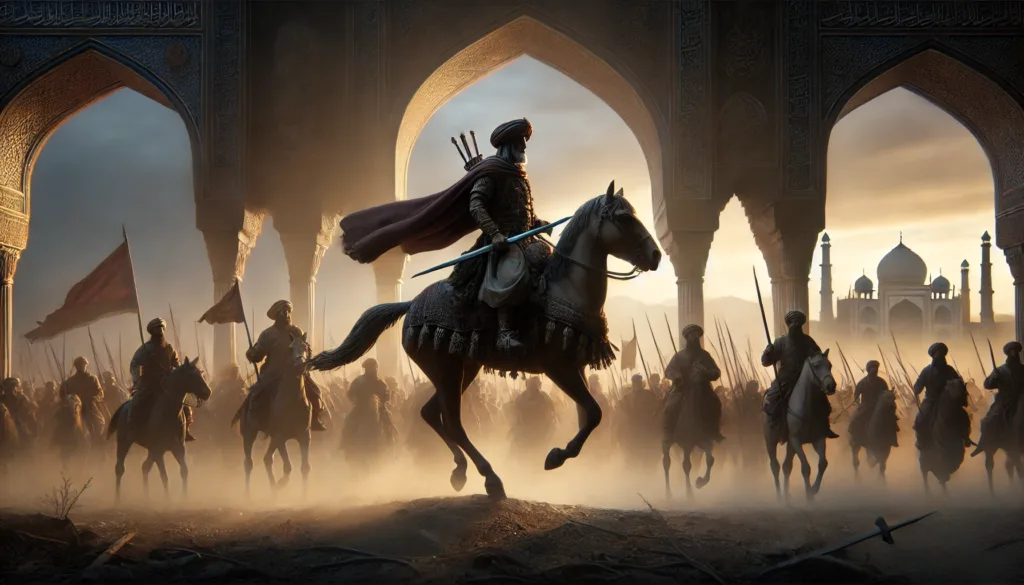
As a result, many people found the call to march under Al-Muthanna’s command burdensome or were hesitant to answer the call. To overcome this hesitation, Umar ibn Al-Khattab (may ALLAH be pleased with him) devised a strategy to encourage the people. He declared that the first person to volunteer would be appointed as the commander of the army. This call was met with response, and the first to step forward was Abu Ubayd ibn Masud Al-Thaqafi (may ALLAH have mercy on him).
Abu Ubayd ibn Masud Al-Thaqafi (may ALLAH have mercy on him) took command of the armies continuing the conquest of Persia. Despite his relatively lesser fame in fighting and leadership compared to some of the other commanders, Al-Muthanna ibn Haritha Al-Shaybani, with his deep sincerity and devotion, did not hesitate to serve under Abu Ubayd’s command.
Under Abu Ubayd’s leadership, the Muslims continued to achieve victories over the Persians. However, during the Battle of the Bridge, a significant mistake was made, resulting in the only defeat the Muslims faced on the Persian front. The Muslims lost 4,000 men, and Abu Ubayd himself was martyred. May ALLAH have mercy on him and forgive him. Following this, Al-Muthanna ibn Haritha Al-Shaybani took command of the Muslim forces once again.
After Abu Ubayd ibn Masud Al-Thaqafi was martyred, Al-Muthanna ibn Haritha Al-Shaybani displayed remarkable leadership and selflessness in organizing an orderly withdrawal, ensuring the safety of the remaining Muslims. Despite the setback, he managed to rally the forces, leading them to subsequent victories over the Persians. His ability to step up when needed, taking charge once more, exemplified his devotion and commitment to the cause of Islam.
Al-Muthanna’s efforts continued until the situation in the Persian Empire had stabilized. By the time the Muslims reached the Battle of Qadisiyyah, Sa’d ibn Abi Waqqas was appointed as the commander. However, Al-Muthanna had already passed away before the battle, leaving behind a legacy of extraordinary service and devotion.
His life serves as a profound example of selfless devotion to ALLAH and the prioritization of the ummah’s interests. Al-Muthanna, originally the leader of his people, humbly served under Khalid ibn Al-Walid’s command, then took charge in Khalid’s absence, achieving victories. Later, he served under Abu Ubayd ibn Masud, organizing a successful withdrawal and securing further victories. Through all of this, Al-Muthanna displayed heroism and unwavering dedication to the greater good, consistently putting aside personal desires for the welfare of the Muslim community.
The Call for Revival: Returning to Selfless Islamic Leadership
The challenges, conflicts, and confusion our ummah faces today can often be traced back to one key issue: the lack of sincere devotion and selflessness towards ALLAH, the Blessed and Exalted. Many of the struggles we experience could be resolved if individuals were to set aside personal interests and prioritize the rights of ALLAH and HIS Messenger. If people acknowledged those more worthy of leadership and closer to ALLAH—those who are better suited for these roles—our situation could improve.
The absence of this selfless devotion is a central reason for our current state, while its presence was a crucial factor in the victories of the past, which we continue to remember with pride.
Conclusion
I ask ALLAH the Almighty to teach us what benefits us, to benefit us by what HE has taught us, and to increase us in knowledge.
Sources:
- Mohamed Elhamy. محمد إلهامي | عصر الخلافة الراشدة | 13. من مواقف التجرد لله. YouTube Video.
- Saheeh International translation ↩︎

